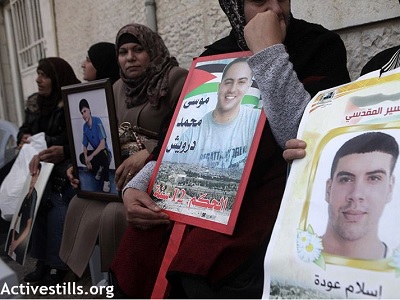
Hadi al-Fakhri was 26 the first time he hugged his father, one of thousands of Palestinians serving time in Israeli prisons for alleged militant activity in the occupied West Bank.
A decade later, more than 30 years into a life sentence, Fakhri’s father was freed when more than 1,000 prisoners were swapped for an Israeli soldier held by Palestinian Islamist group Hamas for five years.The landmark 2011 deal to free Gilad Shalit sparked hope for thousands being held in Israeli prisons.
But more than three years on, with the peace process in tatters and ties with Israel severely strained, Palestinian hopes of seeing their prisoners released look more remote than ever.
Almost every Palestinian family is touched by the prisoners issue.
“Every Palestinian family has experience of the occupation’s prisons — people have either been locked up themselves, or they have a family member who’s been in jail at some point,” said Nojood Qassem, 40, whose husband is serving life.
Her daughter, who is now 13, has grown up knowing her father only through the glass of a prison window.
“My daughter doesn’t even know her father. She only sees him behind glass panes on prison visits, and talks to him via a telephone only then. It’s maybe a couple of times a month,” she told AFP.
Growing up with his father in prison was a tough experience for Fakhri too.
“When you’re a child you want to play with your dad, you want his love, his physical presence, his hug.
“I only got that after 26 years and, instead of being normal, it was a bizarre feeling for me.”
Day of Resistance
The fate of those held in Israeli jails is a highly emotive topic for Palestinians. Prisoners Day, marked every April 17, is widely observed with marches and rallies.
“Prisoners Day is a national day where the Palestinian people express their opposition to occupation, and their support for those resisting it,” said Qadura Fares, a former inmate and head of the Prisoners Club.
Fares was released during a prisoner swap as part of the 1993 Oslo peace accords.
“Palestinian prisoners are in jail precisely because they resisted the occupation. They’re a symbol of resistance,” he said.
On Wednesday, about 200 protesters paid homage to them, waving flags and demanding “freedom” for relatives and friends.
“Today, as we approach Prisoners Day, there are some 6,000 Palestinian inmates in Israeli jails,” a speaker declared through a microphone.
“It is our right to live in freedom!”
But that right is being trampled, the Palestinians say, as the number of inmates increases.
The current number of at least 6,200 is the biggest for at least five years, according to figures from rights groups.
Since the Shalit deal, Israel has rearrested some of those freed and has rounded up hundreds more following the kidnapping and murder of three teens in the West Bank last June.
This month alone, Israel has arrested 49 Hamas members as well as a female MP.
Since 1967, a total of 800,000 Palestinians have spent time inside, according to the Palestinian foreign ministry.
International Action
Few hold much hope of getting their loved ones out of jail any time soon.
Peace talks collapsed last year and many Palestinians feel hopes of resuming some kind of process ended last month after the re-election of hardline Israeli Prime Minister Benjamin Netanyahu, who pledged during the campaign that there would be no Palestinian state on his watch.
Netanyahu subsequently back-tracked, saying conditions were not right at the moment.
But Qassem was pessimistic.
“There’s no hope of release for many prisoners, especially now there are no more talks with Israel. Netanyahu has closed all doors to peace,” she said.
Palestinian officials agree a political solution appears unlikely.
“With a rightwing Israeli government being formed, and with a halt in talks, the political route is closed,” said Issa Qaraqe, head of prisoners affairs for the Palestinian government.
But senior foreign ministry official Majed Bamya alluded to international steps the Palestinians could make on the prisoners issue.
“A new element is that we’ve joined the International Criminal Court. We consider the prisoners issue as one of the priorities” there, he said.
The Palestinians formally joined the ICC this month, and intend to sue Israeli officials for alleged war crimes.
“Mass imprisonment can be considered a war crime, a crime against humanity,” Bamya warned.





